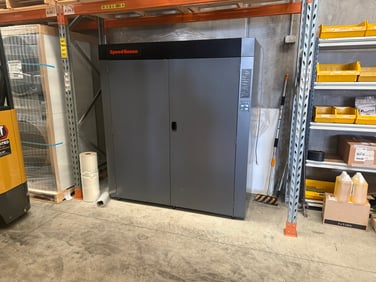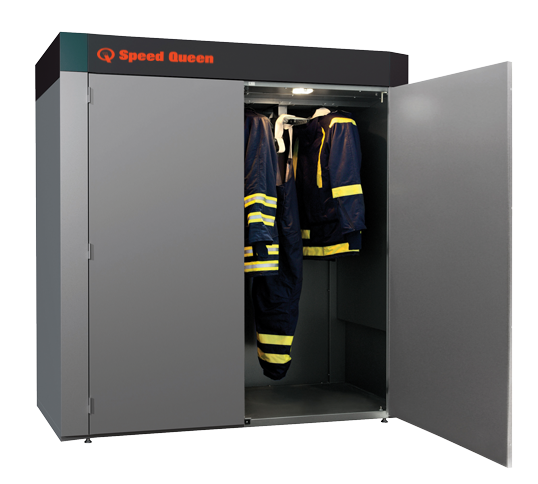Most garments handle tumbling beautifully. That’s why dryers are everywhere! But for items with sensitive coatings or special fabrics, a gentler approach can help them last longer. That’s where drying cabinets step in, offering precise, controlled drying for items that need careful care.
Why Some Items Can’t Be Tumble Dried
Traditional dryers use tumbling and heated airflow which is an incredibly effective method for most laundry. Drying cabinets simply remove the mechanical motion for items that need a different kind of care. For a small group of items like those with reflective tapes, waterproof membranes, or rigid accessories, tumbling isn’t ideal. That’s where a drying cabinet offers an alternative method.
Drying cabinets complement tumble dryers by offering a motion-free option for specialised fabrics that require low or no mechanical action. Garments hang inside a tall, temperature-controlled chamber while warm air circulates evenly.
The result: faster and more controlled than open air-drying, providing a safe alternative for items that aren’t suited to traditional tumble drying.
Heavy-Duty Heroes: First Responder and Workwear Applications
For firefighters, paramedics, and industrial crews, the cabinet is more than a convenience, it’s a necessity.
Personal Protective Equipment (PPE), protective uniforms and turnout gear contain reflective tapes, membranes, and coatings that can be damaged by high heat or constant tumbling. A drying cabinet allows these materials to dry evenly at controlled temperatures, helping maintain waterproofing, flame resistance, and shape. This helps preserve coatings like (PU, PVC, PTFE) that can warp or separate in a tumble dryer.
Boots, gloves, and heavy jackets can also be dried at the same time using racks and hangers, ready for the next shift without losing integrity.
Beyond Emergency Gear: Other Ideal Uses
-
Delicate or Designer Clothing
Dresses, gowns, and tailored suits often come with a “Do Not Tumble Dry” label. The cabinet’s gentle airflow keeps shape and texture intact, perfect for items made from silk, wool, or blended synthetics.
-
Theatre and Costume Departments
Stage and film costumes frequently include sequins, glue, or layered materials. A drying cabinet prevents shrinkage or peeling while still turning around outfits quickly between shows. - Healthcare and Laboratory Uniforms
Scrubs, lab coats, and sterile gowns benefit from controlled drying, reducing lint and extending garment life, an important factor for hygiene and cost control. -
Outdoor, Cold-Storage and Food Processing Workwear
Freezer suits, waterproof aprons, rain gear, and insulated outerwear can be dried efficiently without losing their protective coatings or insulation loft. -
Sports Teams and Training Facilities
Wet uniforms, pads, and gloves dry quickly without risk of warping or melting under mechanical heat, a quiet hero for busy locker rooms. - Electrical/Chemical Industries - eg Arc flash and anti-static garments
Arc-flash and anti-static garments need gentle drying to protect their heat- and static-resistant fibres. Cabinets prevent damage from high heat or tumbling, keeping their safety performance intact. - Animal Care and Veterinary Facilities
Waterproof smocks, boots, and blankets can be safely dried without cracking rubber or melting PVC coatings. Reduces odour and microbial growth between shifts. - Aviation and Maritime Gear

Flight suits, immersion suits, and foul-weather gear often have membranes, reflective tapes, or inflating components. Drying cabinets prevent thermal damage and preserve waterproofing seals.
- Equestrian and Agricultural Clothing
Heavy waxed cotton coats, waders, and riding gear can’t be tumble-dried without destroying coatings. Cabinets provide low heat to maintain waterproofing and shape.
How the Technology Works
Speed Queen drying cabinets use a fan-driven airflow system to circulate heated air evenly throughout a tall, insulated chamber. Garments hang freely inside on adjustable rails or racks, allowing warm air to pass over every surface without friction or tumbling.
The system draws in ambient air, heats it to a controlled temperature (typically between 40°C and 75°C), and vents moisture-laden air through an exhaust outlet to maintain consistent drying performance. Sensors and timers regulate temperature and drying duration, while an automatic cool-down cycle ensures fabrics finish at a safe handling temperature.
The result is fast, uniform drying that preserves the structure and protective qualities of specialised garments.
Sustainability and Safety in Practice
Because drying cabinets extend garment lifespan, they reduce textile waste and replacement costs. They also operate more quietly and produce less vibration — a bonus where noise control is an issue.
The Bottom Line
A drying cabinet isn’t about replacing a tumble dryer; it’s about complementing it. In every industry where fabric integrity matters — from first responders to fashion — it’s the tool that bridges speed, safety, and care.
Want to find out how we can help you do smarter things with your commercial laundry?

